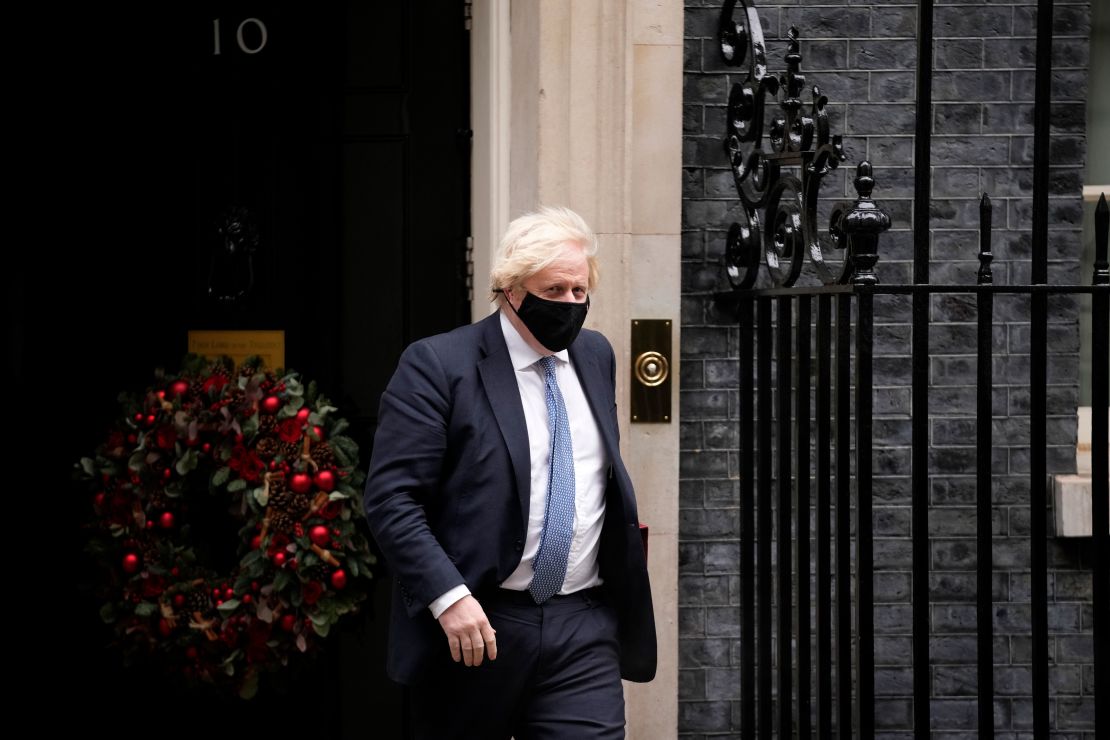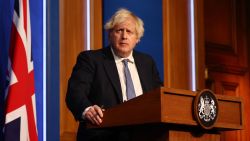Boris Johnson suffered the worst crisis of his premiership on Tuesday night, as weeks of scandal and sleaze culminated in a mass rebellion by many of his own Conservative lawmakers.
While the government ultimately won a series of votes on new coronavirus measures, it did so through the indignity of relying on opposition votes. A total of 99 Conservative Members of Parliament defied Johnson, obliterating his 79-seat majority and leaving Johnson exposed.
The question on lips in Westminster is now: How bad is this for Johnson?
In a word, very. The past two weeks have been dominated by reports that he and his team held social gatherings in Downing Street in winter 2020 while the rest of the country was under coronavirus restrictions and such gatherings were illegal.
Johnson has insisted that he believes no rules were broken, and has asked one of his top civil servants to investigate the alleged parties.
And on Wednesday an image emerged of a Christmas party held at the Conservative Party headquarters on December 14 last year.
The photo, obtained and published by The Mirror newspaper, shows 24 people at an event for Conservative London mayoral candidate Shaun Bailey at the party HQ in London.
The Tories have not responded to CNN’s calls for comment on the newly uncovered photograph, but the Conservative Party had previously moved to distance itself from the event and Bailey.
The issue of Christmas gatherings, or PartyGate, as it’s known, came hot on the heels of a sleaze scandal in which Johnson whipped his MPs to overturn the 30-day suspension of a Conservative colleague who had been found to be in breach of lobbying rules. Owen Patterson had sent multiple emails to government officials on behalf of two companies that between them paid him a salary of £100,000 ($133,000) as a consultant. He initially denied any wrongdoing, but eventually resigned as an MP.
There have been other scandals concerning how the PM paid for the refurbishment of his flat and who paid for a luxury holiday he took.
The pile-up of scandals and inter-party woes is a gift for Johnson’s critics – and the reports are beginning to cut through with the public, opinion polls suggest. Every week, the leader of the opposition is able to question the prime minister in parliament, and on Wednesday, Labour leader Keir Starmer twisted the knife, asking Johnson about the previous night’s rebellion.
“If further votes are needed to save lives,” the Labour Party would follow Starmer’s leadership and help pass the essential measures if his own MPs fail to support him. Starmer asked: “Does the Prime Minister understand why his own MPs don’t trust him?” Johnson declined to answer this specific question.
Starmer asked why people should follow rules that seem to be ignored by many in Downing Street. Johnson was visibly irked by this line of inquiry.
All of this has badly hurt Johnson’s reputation, if personal approval ratings or polls are anything to go by. Politico’s poll of polls has the Conservatives four points behind the opposition Labour Party, while 65% of people disapprove of his leadership.
However, the PM is probably not in any immediate danger of losing his job. In order to remove Johnson from office, 15% of his MPs would need to send letters to the chairman of a group of backbench Conservative MPs, known as the 1922 Committee, calling for a vote of confidence in his leadership.
The number of letters sent is always kept private, but it’s not thought to be anywhere near that threshold. Even if it were to be reached, it’s unlikely Johnson would lose the vote. This would in turn would make him immune from another leadership challenge for 12 months. It would not be in the interests of those seeking to remove Johnson to show their hand by voting against him only to lose. And there is an argument that keeping him in office sufficiently damaged that he can be controlled might be the best way forward for now – no one wants to pick up his mess.

There is also little prospect of a vote in parliament that could collapse his government. Losing a protest vote that your rebels know is going to pass on opposition votes is very different to a vote that could collapse a government and trigger a general election.
But none of this means Johnson is completely safe. There is a theory that political leaderships are ended not by a single shot, but by a thousand cuts.
Individual events don’t suddenly turn people around and change minds, but the general stink eventually catches up with you. And for a politician like Johnson, this is dangerous.
He came into office with a reputation for not being entirely trustworthy. The circumstances under which he won the 2019 election were extremely unusual (Brexit was deadlocked and the then leader of the opposition, Jeremy Corbyn, was historically unpopular with voters).
The danger for Johnson is that many voters believe that if someone can lie about one thing, for example details of how Brexit works, it’s a short step to believing they will lie about anything.
And unfortunately for Johnson, it’s possible he’s passed the point of no return and that these scandals will follow him around until the end of his leadership. The question is how soon will that happen.




















